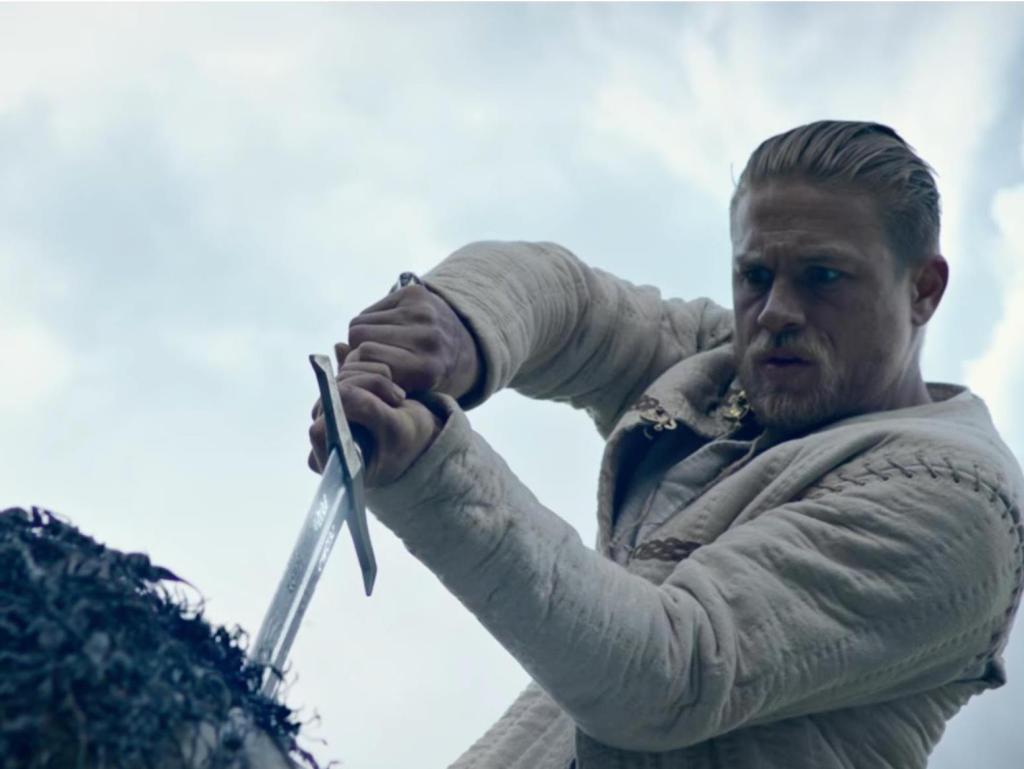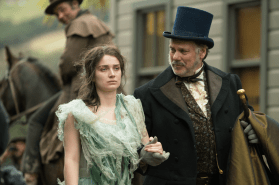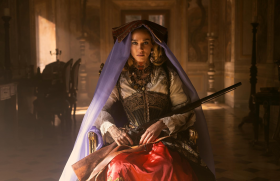In King Arthur: Legend of the Sword’s pre-title introduction sequence, humanity and sorcery collide — and with the latter comes giant, building-sized elephants. The scene is grey and bleak, establishing the film’s gritty leanings. The carnage is considerable, with structures crumbling and people lost in the fray. The sense that greater ruin awaits is palpable. Already known for reinventing one classic figure in English literature, writer/director Guy Ritchie brings his Sherlock Holmes touch to Camelot, immediately signalling that his interpretation doesn’t take its cues from 1981’s Excalibur, 1995’s First Knight, 2004’s King Arthur or the many other movie adaptations of the Arthurian legend. As the rest of the feature clambers on, however, the director’s approach sees him share much in common with the jumbo mammals he gleefully highlights in the film’s early frames.
Whether coming to King Arthur: Legend of the Sword with a wealth of knowledge about the folkloric British figure, or little, viewers will find the same thing: Ritchie’s usual stylistic flourishes, aka slow-motion fights, fast-paced editing, jaunty banter, and a fondness for telling as he’s showing, all used as a crutch to prop up a well-worn tale. This decade’s version of the story doesn’t suffer from familiarity with its specifics — the sovereign and his castle, blade, knights, and table — nor from the filmmaker and his co-scribes Joby Harold (Awake) and Lionel Wigram’s (The Man from U.N.C.L.E.) fondness for playing fast and loose with the established mythology, but rather from its evident determination to frame the narrative as yet another origin story.
As a child, Arthur (Downtown Abbey’s Oliver Zac Barker and his first-timer brother Zac Barker) watches on as his family feuds and his country suffers. Ostensibly, the conflict springs between those with magical abilities and those without, though sibling rivalry between Arthur’s father, King Uther (Eric Bana, Special Correspondents), and uncle, Vortigern (Jude Law, The Young Pope), proves the real source. Years later, having grown up in the care of prostitutes in Londinium and boasting his own small-time criminal empire, the adult Arthur (Charlie Hunnam, The Lost City of Z) is forced to face the new ruler when Uther’s sword reappears. He doesn’t remember his past until he pulls Excalibur from stone, and he doesn’t see reclaiming his crown in his future, but a small group of rebels — his father’s former allies Bedivere (Djimon Hounsou, The Legend of Tarzan) and Bill (Aidan Gillen, Game of Thrones), plus an enchantress known as the Mage (Astrid Bergès-Frisbey, I, Origins) — are certain that he’s the leader his realm needs.
Watching Arthur dispelled from his home, endure a difficult childhood, learn who he is, and tussle with his birth right couldn’t be more routine; indeed, though he’s the one capitalising upon cinema’s current fondness for classic heroes given tough beginnings, Ritchie appears as unenamoured with it as the audience. Instead, while throwing supernatural touches in wherever possible and taking inspiration from other big and small screen fantasy, adventure and epic efforts, his film revels in sticking with a template-like tale, purely to afford the director a platform to thrust his specific brand of flair to the fore. Across his nine-feature career, ensuring that his visuals service his narrative, rather than overpower it, has never been Ritchie’s primary concern, but the likes of Lock, Stock and Two Smoking Barrels and Snatch still worked to present engaging stories. King Arthur: Legend of the Sword’s plot couldn’t be more boilerplate — or provide a blander canvass to layer splashes of flash for flash’s sake onto.
With a slain father, a friend turned usurper turned foe, gangs warring, and many a musing over the whether to take charge or shirk his calling, sadly Hunnam is in territory he’s already traversed as well; at its most basic, much of the plot mirrors TV’s Sons of Anarchy, the show that brought him to broader fame. He’s actually at his strongest when he’s hitting emotional notes he has struck before, particularly considering neither Arthur nor the rest of the film’s characters are given much depth by the script. Law is solid as the power-seeking Vortigern, as is Hounsou as Arthur’s mentor, even if both are only asked to do the same thing over and over. Other than the over-sized elephant crashing across the screen — serving up blatant spectacle and causing an obvious impact, but offering nothing of substance — it’s King Arthur: Legend of the Sword’s one glaring piece of stunt casting that perhaps sums up its fortunes best. When David Beckham comes into sight, his presence smacks of attention-seeking and nothing else.
Rating: 2 stars out of 5
King Arthur: Legend of the Sword
Director: Guy Ritchie
USA, 2017, 126 mins
Release date: May 18
Distributor: Roadshow
Rated: M
Actors:
Director:
Format:
Country:
Release:





